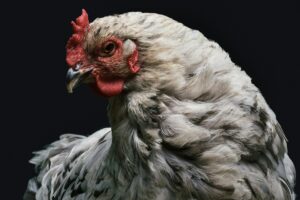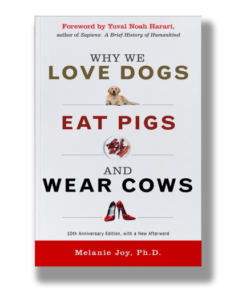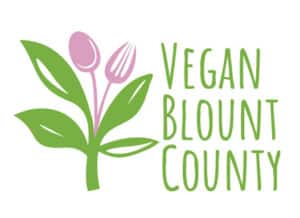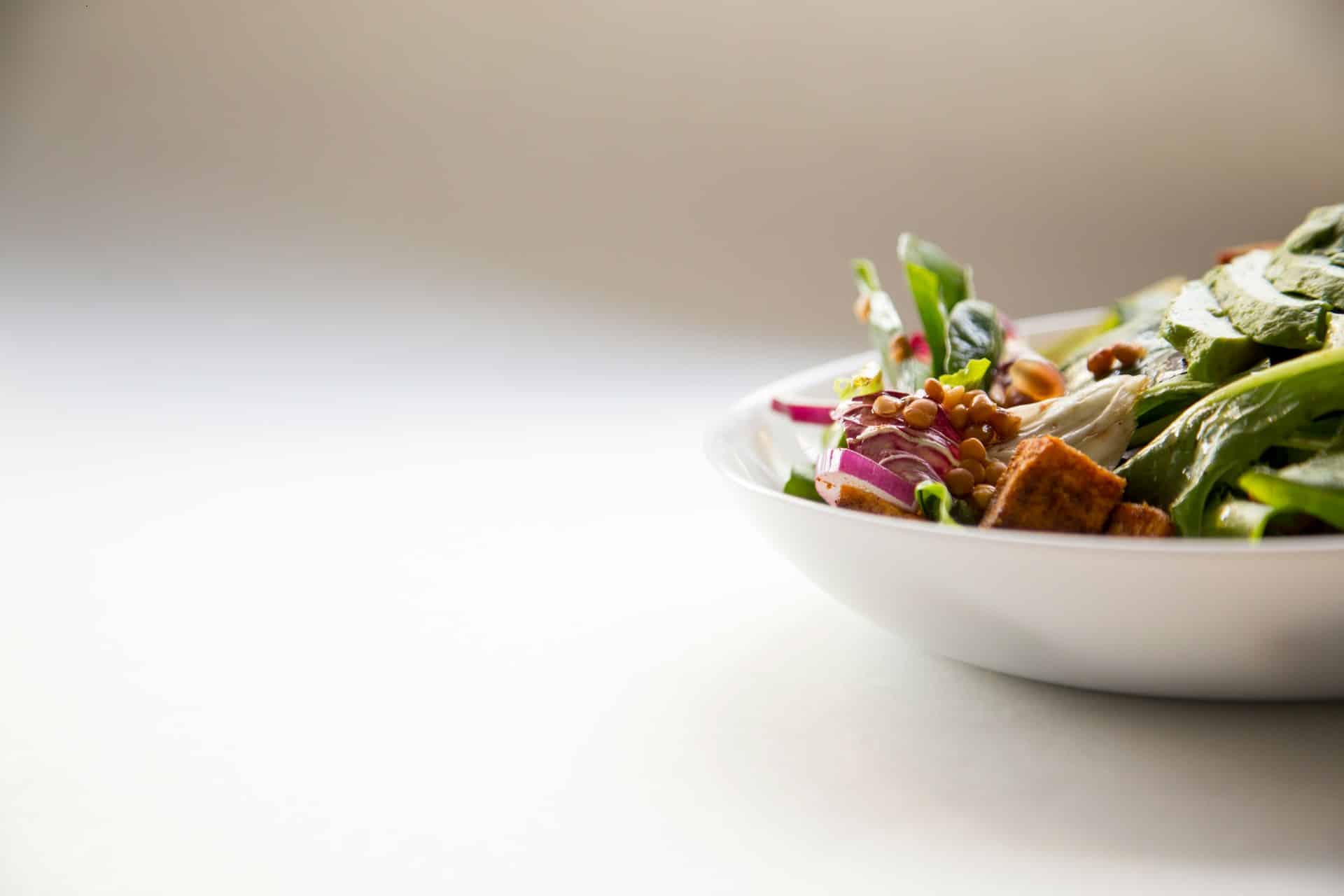- How To Learn From Melanie Joy’s Enlightening Concept of Carnism To Improve the World - June 24, 2024
- Unwrap Compassion: Unique Gifts for Vegans That Inspire and Delight - December 11, 2023
- Enjoy The Delightful Plant People Boutique: Beautiful Plants and Lovely Snacks - November 20, 2023
Psychologist Melanie Joy coined the term carnism to describe the invisible belief system that conditions people to eat certain animals. It explains why societies consider it normal, natural, and necessary to consume animal products despite ethical and environmental reasons for not doing so.
To understand the concept of carnism, watch this video, “Formula for a Better World.”
I’ve been vegetarian for 40 years and vegan for 10 years. You can read my story about my reasons for leaving animal products behind at Life At The Intersection.
Key Aspects of Carnism
Carnism is supported by social and psychological mechanisms that let people disconnect from the moral implications of what they eat. Sadly, most people are unaware that their food choices come from such a belief system.
How does this happen? We have been socialized all our lives by our family, our religious figures, and the government that eating animal products is, as Melanie Joy states, normal, natural, and necessary.
When confronted with something that conflicts with our beliefs, we experience cognitive dissonance. Cognitive dissonance is the discomfort we experience when we hold conflicting beliefs. An example:
“Your family is supportive of your decision to quit smoking. But one day, you’re super stressed, so you sneak a cigarette when your family isn’t around because you don’t want to disappoint them. You may experience cognitive dissonance if these actions make you feel guilty or if you feel like you’ve let your family down.” – Cleveland Clinic
Carnism helps people avoid the cognitive dissonance of loving their pets while eating other animals. The ideology of carnism is supported by common rationalizations, like the belief that eating meat is necessary for health or that animals are put on this planet to be eaten.
“Carnism runs counter to core human values, such as compassion and justice. Most people wouldn’t willingly violate these values and support unnecessary violence toward other sentient beings. Therefore, carnism—like other oppressive systems, such as patriarchy and racism—uses a set of psychological defense mechanisms that distort our thoughts and block our natural empathy, so that we act against our values without fully realizing what we’re doing. In other words, carnism conditions us not to think and feel.” – Melanie Joy
Problems With Carnism
 Whatever your reason for becoming vegan, you are aware of the impact of factory farming on animals, on the environment, on public health, and, of course, on the animals themselves. Making people who eat and use animal products aware of these issues is critical.
Whatever your reason for becoming vegan, you are aware of the impact of factory farming on animals, on the environment, on public health, and, of course, on the animals themselves. Making people who eat and use animal products aware of these issues is critical.
- Factory farming significantly contributes to greenhouse gas emissions, accounting for around 14.5% of global emissions. The farms can contaminate waterways with manure, fertilizers, and pesticides, harming aquatic life and human health.
- Factory farms can spread antibiotic-resistant bacteria and other pathogens, increasing the risk of foodborne illnesses. Exposure to air pollutants from factory farms can worsen respiratory issues and other health problems.
- Because of the priority of profit over animal welfare, factory farms are inhumane, overcrowded, and stressful. Animals are often subjected to painful procedures, such as tail docking and beak trimming, without pain relief.
- Factory farms often rely on low-wage, temporary, or migrant labor, enabling social and economic inequalities. The farms can displace local communities, disrupting traditional ways of life and cultural heritage.
How Vegans Can Deal with Carnism
By making conscious choices about the food you eat and supporting more sustainable agriculture, you reduce the negative impacts of factory farming and promote veganism over carnism.
It can be difficult when you confront carnism and its impact. It is for me. Sometimes, I must disengage from media or conversations where carnism is on display. But I also know that helping others understand the impact of carnism is a form of self-care since volunteering and activism have been shown to improve your physical and mental health. That helps me do what I can to make a difference.
Another way to deal with carnism is to remember that the systems that create it are often invisible to people who eat animal products because of deeply ingrained beliefs and cultural norms. Instead of reacting with frustration, I try to see this as an opportunity to help them understand the impact of their choices. Remember that change is gradual, and people may not immediately shift their beliefs or habits.
And ultimately, I must accept that they may not change their behavior even if they understand carnism.
Prioritize your self-care and keep people around you who support you and your cause.
Tips for Vegan Advocacy
If you are vegan, you are already making a difference through leading by example. You are showing the benefits of a vegan lifestyle through your actions and choices. So, share this knowledge with others through conversations and social media.
Be ready to talk about how delicious vegan food is. Suggest tasty and accessible plant-based alternatives to animal products.
 And, if people you talk with are open to learning more, Why We Love Dogs, Eat Pigs, and Wear Cows: An Introduction to Carnism, by Melanie Joy, is a great place to start.
And, if people you talk with are open to learning more, Why We Love Dogs, Eat Pigs, and Wear Cows: An Introduction to Carnism, by Melanie Joy, is a great place to start.
When I speak about veganism, I sometimes ask the question, “Why do you eat meat?” There is usually an awkward silence, and then someone will say, “Because it tastes good.” I agree with them, which opens the door to other responses.
Many times, people comment about needing protein to be healthy. In particular, athletes tell me they need meat to be effective. So, I ask them to watch the documentary “The Game Changers” to get a different perspective. And to share the movie with their coach.
I thank them for their answers and tell them I understand. I describe why I stopped and how that has been positive for me.
Finally, I talk about how factory farming of animals affects climate change and ask them to reduce their consumption of animal products. Because if everyone did that, we’d be closer to a healthy environment.
“Cutting back on beef makes a big difference. One 2022 study in the American Journal of Clinical Nutrition found that swapping out beef for a single meal can reduce a person’s carbon footprint for that day by almost half.” – Bloomberg
By understanding carnism and using compassionate strategies, you can advocate for animal rights effectively and encourage others to consider plant-based lifestyles.
READ NEXT
How to End Injustice Everywhere, by Melanie Joy
Compassionate Tourism: How To Travel With Concern for People, Animals, and Land
How To Increase Vegan Options in Your Hometown
Why You Should Celebrate World Vegan Day Even if You Eat Meat
My Big Fat Italian Veganfest (And My Small Skinny Scruffy City One)




